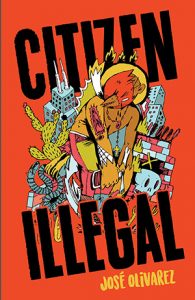
Published by Haymarket Books
In his debut collection, Citizen Illegal, José Olivarez manages to be unrelentingly blunt about racism, gentrification, and poverty in poems that are characterized by playfulness. This dynamic is evident in many of the titles, such as “The Voice in My Head Speaks English Now,” “I Walk into Every Room & Yell Where the Mexicans At” and “I ask Jesus How I Got So White” (Jesus responds “man, / I’ve been trying to figure out the same damn thing myself.”)
Olivarez’s probing interrogations of identity and assimilation are rooted in a loving celebration of his experience as a first-generation Mexican-American growing up in Calumet City, a working class suburb Chicago. He writes about gentrification and also its imagined opposite, “Gentefication,” in which “mi Abuelita Jacinta is back / with the living, she’s kicking the juicers out / of her kitchen & making masa. the whole block / heard what’s happening, & outside the hydrants / open and flood the streets.”
“(Citizen) (Illegal),” the title poem that opens the book, is marked by parenthetical interruptions that enact the sense of disruption and trauma that come with constantly being subjected to such categorization and judgement:
Mexican woman (illegal) and Mexican man (illegal)
have a Mexican (illegal)-American (citizen).
is the baby more Mexican or American?
place the baby in the arms of the mother (illegal).
if the mother holds the baby (citizen)
too long, does the baby become illegal?
A series of short poems all titled “Mexican Heaven” (first published as one longer poem in issue 24 of The Adroit Journal) is threaded throughout the book. This heaven seems to reproduce a warped version of the struggles faced by Mexican immigrants in the United States, with the promise of a blissful afterlife sometimes realized—”there are white people in heaven, too. / they build condos across the street & ask the Mexicans to speak English. / i’m just kidding. / there are no white people in heaven”— and sometimes not:
St. Peter lets Mexicans into heaven
but only to work in the kitchens.
A Mexican dishwasher polishes the crystal,
smells the meals, & hears the music.
they dream of another heaven,
one they might be allowed in
if they work hard enough.
Olivarez is deeply committed to writing poems that connect with a young audience, especially young Latinx people in Chicago. That connection is such a strong emphasis that two of the blurbs on the book’s back cover are provided by young poets Vicky Peralta and Luis Carranza, who were both students of his and participants in the “Louder Than A Bomb Squad” apprenticeship program sponsored by Young Chicago Authors (of which Olivarez is the marketing manager). In addition to his deep involvement with youth poetry scene in Chicago, Olivarez is a co-host of the poetry podcast The Poetry Gods.—Tina Gross